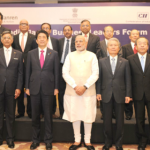India and Japan are the two big democratic countries in Asia that have in common universal values and strategic interests. Yet, their patterns of behaviour and ways of thinking are at the other end of the spectrum from each other. This may be one of the secrets to their continued good relationship.
The voices we hear from Japanese companies are often about investing in India: that “India has a high potential for investment, but it is hard to make profits due to strong competition”, or that “Different languages from province to province and complicated regulations make it difficult to get the permissions to invest”. The hurdles seem to be high for small and medium companies, and as a result, many of them remain a market to be explored as a long-term target for investment opportunities.
The inauguration of the Modi administration influenced the activities of the Japan-India Business Co-operation Committee (JIBCC) of whose standing committee I am chairman. In September 2014, newly elected prime minister Modi chose Japan as the first destination for an official trip abroad, and he and Prime Minister Abe promised to double the Japanese investment and the number of companies investing in India in the next five years. Since then, visits of officials in the central and state governments have rapidly increased. The JIBCC has also organised, in collaboration with the Embassy of India in Japan and the Japan External Trade Organisation (JETRO), many investment seminars to attract Japanese investment into India.
It is only with India that the Japanese prime minister exchanges a mutual visit annually at the highest level. Compared to this favourable relationship on the political and diplomatic front, the challenge for the Japanese business community is that it has many areas that could be improved on the economic front, including trade volumes, investment amounts and the number of Japanese companies investing in India.
Currently, India is trying to attract manufacturing companies from overseas countries under the slogan of ‘Make in India’ and the whole world has paid attention to India as it is a country with a population of 1.3 billion and the high potential of a rapidly growing consumer class.
It is only relatively recently, in 1991, that India made a transition to a market economy. Although the number of Japanese companies that have invested in India increased to 1441 as of 2018, it compares unfavourably with such Asian countries as Thailand and Indonesia, apart from China, which has attracted 30,000 companies.
According to a November 2018 survey on Japanese overseas direct investment, conducted by the Japan Bank of International Cooperation (JBIC), India ranks second in terms of prospective investment potential in the medium term, lagging behind China over two consecutive years. China’s strength reflects its market that can produce profits currently. On the other hand, India’s advantage overwhelmingly depends on the expectations from its future growth potential.
Can we expect the number of Japanese companies that invest in India to increase in the future? The first challenge, pointed out in the survey, was “severe competition with other companies”: individual companies will have make their own efforts to deal with it. Other challenges include: “opaque implementation of regulations”, “insufficient infrastructure” and “complicated taxation system”. The old perception about the implementation of regulations is now rapidly changing as there emerges an assessment that a significant improvement has been seen in such areas, as GST and others. The JIBCC, in cooperation with the Federation of Indian Chambers of Commerce and Industry (FICCI), is determined to continue to ask the central and state governments to do their best to resolve the issues involved.
In the last quarter of a century that I have been in contact with India, both countries constantly strive for building a relationship of trust in the long-term vision and steadily make efforts to strengthen the bond. I do not know how helpful I can be, but I will contribute to the task of deepening ties between India and Japan.
Muneo Kurauchi is Managing Director, Institute of International Monetary Affairs (IIMA), Japan.
This blog was exclusively written for Gateway House: Indian Council on Global Relations.You can read more exclusive content here.
For interview requests with the author, or for permission to republish, please contact outreach@gatewayhouse.in.
© Copyright 2019 Gateway House: Indian Council on Global Relations. All rights reserved. Any unauthorized copying or reproduction is strictly prohibited.


